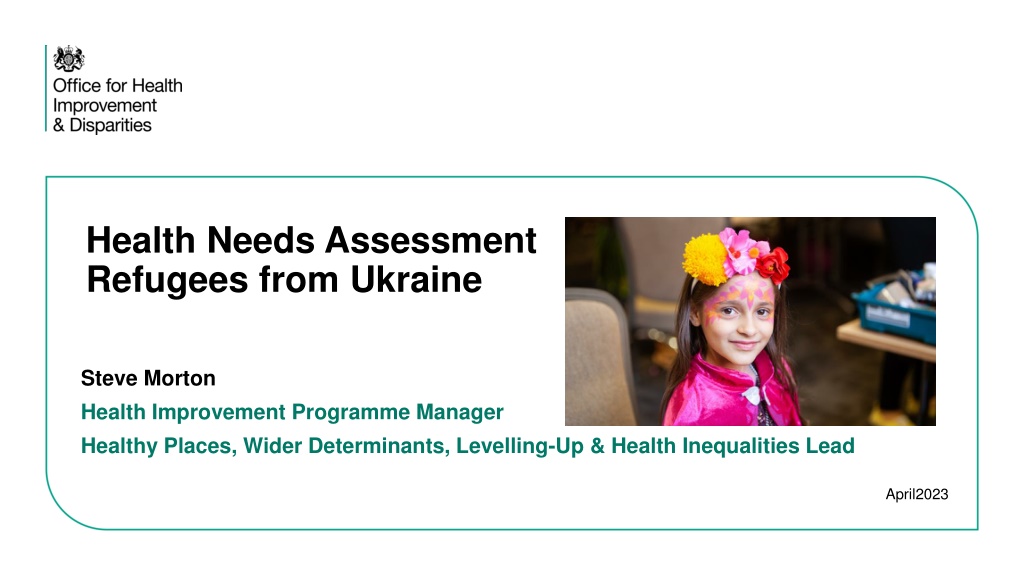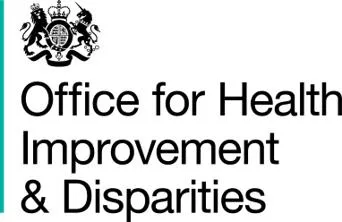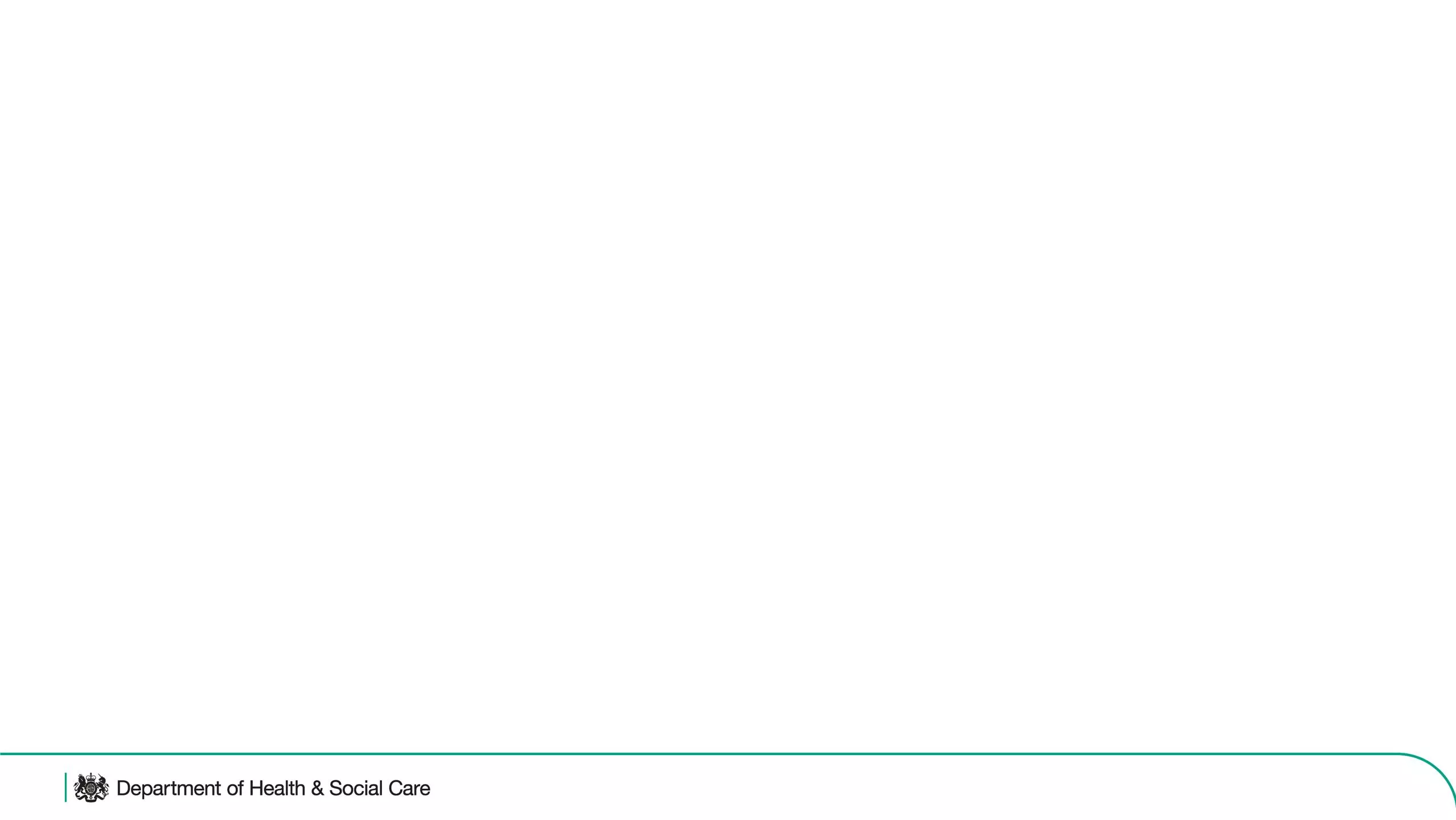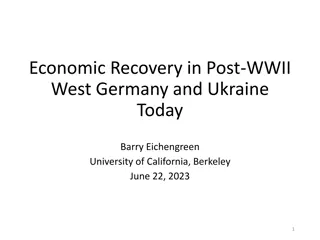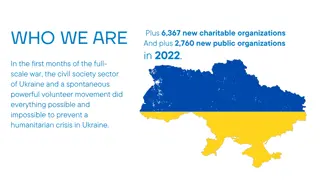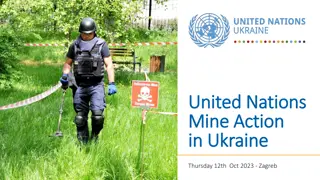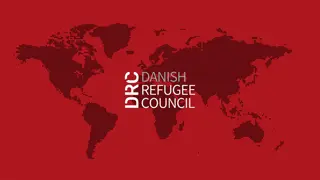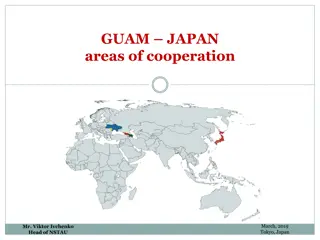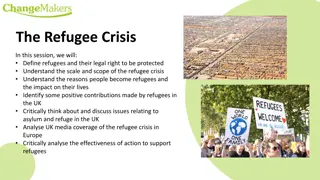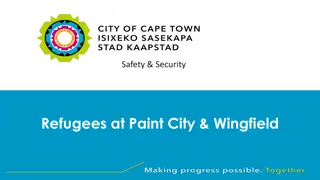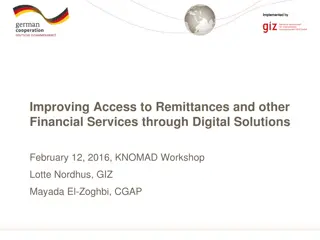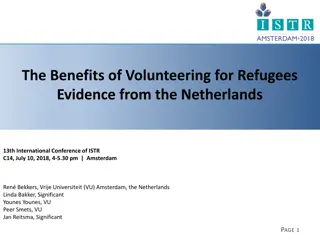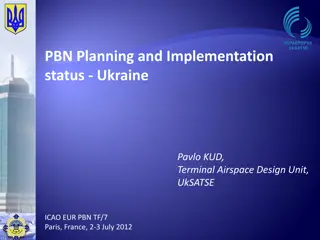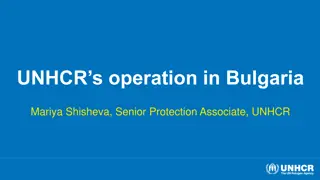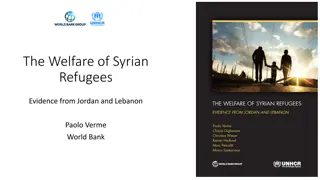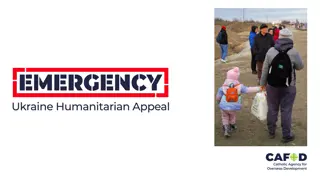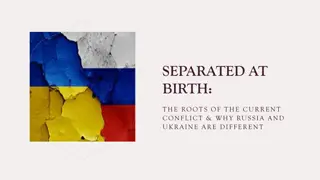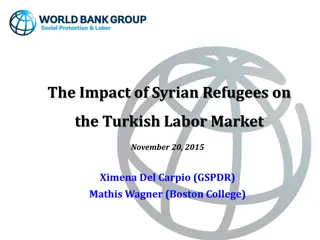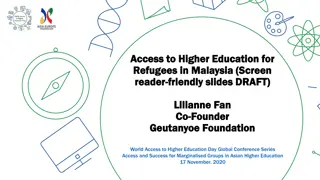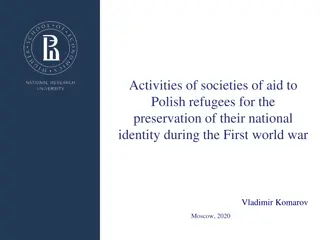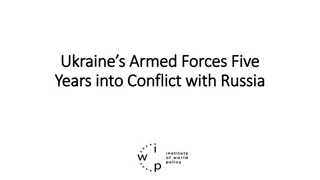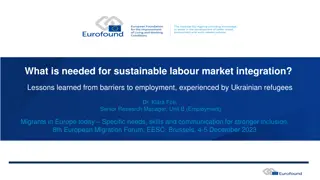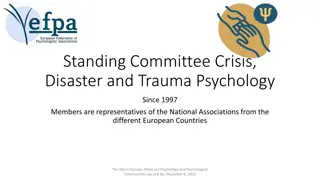Health Needs Assessment Refugees from Ukraine.
Conducted by Steve Morton, the health needs assessment focuses on refugees from Ukraine, addressing underlying health issues, cultural preferences, and wider determinants. Recommendations are aimed at local forums and system leaders to inform policy and resource allocation for improved healthcare access and services.
Download Presentation

Please find below an Image/Link to download the presentation.
The content on the website is provided AS IS for your information and personal use only. It may not be sold, licensed, or shared on other websites without obtaining consent from the author. Download presentation by click this link. If you encounter any issues during the download, it is possible that the publisher has removed the file from their server.
E N D
Presentation Transcript
Health Needs Assessment Refugees from Ukraine Steve Morton Health Improvement Programme Manager Healthy Places, Wider Determinants, Levelling-Up & Health Inequalities Lead April2023
HNA Suite of materials 1. Full Technical Report 2. Summary Report 3. Summary of Recommendations 4. PowerPoint Presentation
Contents Remit Background Methodology Literature Search Participant data Key Findings Differences & Commonality with other refugee populations Recommendations
Remit Assess and describe the health needs of people arriving from the Ukraine, Especially those who have been here several months with initial sponsorship in northwest England Review data on underlying morbidity issues, health status, health needs, cultural preferences, and measurable wider determinants, then analysing and interpreting this to advise policy. Aims its recommendations at the Northwest England regional, system and local level forums in local government and health. The content of the recommendations considers the differing needs, demands, financial and political climates Support decision makers, policy leaders and system leaders to inform prioritisation, resource allocation and rationing decisions in health and other service delivery by taking a pragmatic and politically astute approach at regional, system and local level. Determine priorities for future development and research areas, including identifying potential funding sources for research. The target audiences are Local Authorities (Public health, housing, education, members), NHS (NHS E, ICBs, PCNs),OHID, UKHSA, Strategic Migration Partnership.
Background Russian invasion of Ukraine 24 Feb 2023 Over 10 million refugees and 8 million internally displaced (UNHCR) UK government predicted approx. 200k refugees arriving in UK Two main schemes established for Refugees entering the UK No HNA has been carried out in England Numbers entering via Homes for Ukraine are published by LTLA Previous migrants have experienced cultural and access to healthcare issues
Methodology Key Consultees Association of Ukrainians in Great Britain Cumbria Supports Ukraine DHSC Ukraine Team Homes for Ukraine Lancashire Kalyna Ukrainian Community Lancashire Refugee Integration Team Liverpool PCN Liverpool City Council Public Health, Emer Coffey Morecambe Bay Teaching Hospitals NHS Trust, MORRA Project North West Strategic Migration Partnership Dr Aaron Poppleton Rooms for Ukrainians NW Sponsor, Accommodation & Jobs for Ukrainians Group UKHSA, Tanith Palmer Ukrainians of Manchester Web and grey literature Stakeholder engagement Literature Review Survey Analysis Recommendations Publication & Dissemination All data up to Feb 2023 Survey Jan-Feb 2023
Literature Search 1. 2014 to December 2022 (to represent and align with the timing of the annexation of Crimea by Russia) = 35,867 document results Ukraine OR Ukrainian OR refugee OR migrant AND "health need" OR "health" OR "medicine" OR "medical" OR "mental health" OR "stress" OR "depression" OR "post traumatic stress" OR "PTSD" OR "anxiety" OR "isolation" OR "physical health" OR "communicable disease" OR "infection*" OR "chronic disease" OR social" OR "access" OR "integration" OR "culture" OR "housing*" OR "education*" OR "care" 2. Only UK and English language articles = 4718 document results 3. Other languages = Excluded 4. Restrict to social sciences, medicine, nursing, immunology, health professions, multidisciplinary, and dentistry = 4136 document results 5. Restrict to articles, book chapters, government guidance and conference notes = 3406 document results 6. Limit to 2022 (Russian invasion of Ukraine) = 2555 document results 7. Sort on relevance. Review abstract and title of top 250 results = 115 results 8. Review of full text of documents = 85 results
Demographics Key Findings Average age = 35 years 1 month
General Health Findings Refugees report a decline in their personal health standards since arriving in the UK. The focus group established that although their health had declined, they felt that it would have been a lot worse had they remained in Ukraine. Key reasons for the decline in health were; Concern for those back at home A fear of the unknown Being disorientated in a new country Language difficulties PTSD and other mental health issues as a result of the time they left Ukraine Concerned about their child s education and development Difficulties in navigating the health system in the UK Loneliness (missing loved ones) Changes in diet Changes in water and air quality Digestive issues Skin complaints thought to be due to changes on types of employment (factory work and food prep) Muscular and Skeletal disorders brought about by carrying out manual labour rather than usually doing deskwork.
Access Findings Vast majority have registered with a GP. However, anecdotal evidence suggests that recent influxes of asylum seekers do not re-register when they move/are moved, will refugees act similarly? Discussions at both the focus group and MORRA workshop indicated that migrants are experiencing similar difficulties in accessing primary care as many native population report. However, migrants feel that they are being excluded, being made to wait longer for an appointment and misunderstood.
Access Findings Refugees had experienced considerable procedural, cultural and language difficulties in accessing NHS services, especially General Practice. Only mid-level trust in health professionals in England (63.7%). Cultural dismissal of the UK gatekeeper GP role. It is likely that this perception is a consequence of the high level of education and home income of those who have travelled to the UK. Concern was greatest in relation to paediatric health care. Belief that children should be prioritised and see paediatricians.
Existing Conditions Findings Drug addiction in Ukraine has its peculiarities, it has a group character in Ukraine. Opium poppy straw extract continues to be the main drug of choice. Marijuana is growing in popularity among young people and use of synthetic drugs is appearing with increasing frequency.
Infectious Diseases Findings Low rates of vaccination Diphtheria-Tetanus-Pertussis Polio Flu (Influenza) Measles-Mumps-Rubella (MMR) COVID-19 Hepatitis B BCG (for those under 16) Ukraine has one of the highest rates of Multi Drug Resistant Tuberculosis the world (27%). The 4th highest globally. It also has the 2nd highest total TB incidence rate. AMR rates are much higher than in the UK. This includes MRSA (18-38%) High rates of STIs including HIV
Trauma Findings Health professionals and UNFPA have recorded more premature births, hypertension problems during pregnancy or non-pregnancy-related conditions such as uterine prolapse amongst women refugees leaving Ukraine Three of the 210 participants reported witnessing physical or sexual violence, two reported experiencing forced detention/ labour or sexual exploitation/human trafficking. This indicates that refugees arriving in north west England from Ukraine may require support relating to such experiences. Mental Health Score /3 1.87 Generalised Anxiety Disorder Questionnaire (GAD-2) How would you rate your mental health now? (0-3) Over the last 2 weeks, how often have you been bothered by feeling nervous, anxious or on edge? 1.53 Several days - More than half the days Over the last 2 weeks, how often have you been bothered by not being able to stop or control worrying? 1.24 Several days - More than half the days
Oral Health Findings Considering the relatively low levels of Oral health in Ukraine pre-war, we can assume a need for dental health services on arrival in the UK. To determine possible needs for dental services whilst in the UK, survey participants were asked when they last saw a dentist. 70% had seen a dentist within the preceding 24 months in Ukraine, 5% had received dental treatment within five years in Ukraine A further 44 refugees from Ukraine had already visited a dentist in the UK. This would indicate that those refugees who had come to north west England had better access to dental care in Ukraine than the average population and consequently, should have better oral health. 9% were experiencing oral pains that kept them awake, indicating potential serious conditions including abscess, infection and oral cancer.
Experience Comments I do not receive the treatment that I received in Ukraine. I feel better in the UK, because I don t hear explosions. Sometimes I m scared of fireworks. "I feel excluded from the NHS care in the UK. In Ukraine I used to have hight standard of medical care and support by the free government medical service. GP found good medication for my blood pressure level I had perfect health before arriving in the UK. After 2 months being in the UK I started to have severe migraines and asked for the MRI diagnostics in June 2022, Now January 2023 and I still have no appointment given by NHS, my needs Ignored. I prefer to treat my teeth in Ukraine. It is cheaper and more quality. I think mentally it is still very difficult to go through what I am going though even though I ve been in the country for almost a year now I think that medical system of England is like in Africa. Especially dentists. Education and their abilities is very bad. "Sexual health care is much better here. Dental care is very bad and impossible to get. It is very accessible and high quality in Ukraine."
Wider Determinants Findings Initial housing agreement is for 6 months only Some have been extended Some have been relocated Some have been placed in hotels etc There is a risk of homelessness Many Ukrainian Community Support Hubs to support new residents upon arrival to the local community. The hubs are often a central place to come to get items refugees may need when they arrive (clothes etc), and to get the information and support to help them to settle in the UK. They provide a safe space to integrate with other Ukrainian families who were fleeing their homes during Russia's invasion of their home country.
Childrens Health Findings Of the 210 who responded to the survey, 35 reported that they brought children with long term conditions with them to the UK. Nine stated that they had children with disabilities. Overall, the children who have arrived are reported to be in generally good health. When asked how often their children needed treatment only 59 said they received medical treatment in any one year
Differences & Commonality with other refugee populations Language Culture Access Disorientation Need for guidelines Education Affluence Position in society Predominantly female More children GP Gatekeeping
Recommendations This report includes several the recommendations to the health care system, local authorities, government departments, voluntary sector, and universities. Ukrainian refugees consulted recommended that there should be; Support for community liaison/champion/navigator type roles Better explanation of how the health system works at an early stage prior to and immediately on arrival Quicker and easier access to translators/mediators Improved cultural competence amongst clinical staff including the social and cultural aspects of refugees
Recommendations Additionally, the report identifies further recommendations to address; Improved screening Regular refresher training for staff Housing insecurity Societal education Improved welcome packs English Language lessons Sexual Health screening Improved targeted psychological support Adopting a Trauma Informed Approach Commission and carry out further research in relation to o Cultural Competency Training o Benefits of hosting refugees o Effectiveness of Community Champions
Recommendation Refresh NHS frontline staff understanding of OHID s migrant health Guide which provides practical advice for healthcare workers including specific guidance on the health needs of migrants from Ukraine, how the NHS works and their entitlements to healthcare, how to comprehensively assess new migrant patients and ensure continuity and alignment with the UK immunisation schedule for routine and COVID-19 immunisations. Fill knowledge gaps by easing access to linguistically and culturally translated NHS guidance, including via community social media such as Telegram and Viber chats. Identify and train community champions to support Ukrainians engagement with health, social, and educational services. Responsible organisation PCN Access to Health Care OHID NHS England PCN NHS England ICB PCN Local Authority Increase use of medical translation services and introduce Ukrainian Care buddies to accompany refugees to appointments PCN ICB Ensure free ESOL and other English language courses are available to refugees. Additional ESOL funding is available, and all Ukraine refugees are entitled to use this provision immediately. Support in registering with and requesting interpreter services for NHS Talking Therapies/social prescribing. Online mental health options, such as private video consultations with Ukrainian- and Russian-speaking professionals, Ukrainian self-directed counselling via chatbot, and social media support groups Research benefits, methodology and impact of digital solutions for treatment of refugees. Funding may be available from the NIHR Digital health inclusion and inequalities. Community Hub Local Authority ICB NHS England ICB OHID Signposting to local cultural, community, and church groups for practical and wellbeing support. These groups are often accepted, empowering, and manage subthreshold mental health symptoms. Local Authority RSMP AUGB
Health Care 1 Recommendation Encourage and protect time to complete existing Cultural Competency Training available on e-Learning for Health. Supported by production of specific cultural information flashcards regarding Ukrainians. Research effective methods of cultural competency training in a clinical setting. A strong candidate for a funding source for this work would be the NIHR to address the research question: What interventions are effective in increasing the health and wellbeing of asylum seekers and refugees in the UK? Commission and use health Information Systems which record the refugee status of patients Responsible organisation PCN OHID Prev HEE OHID Universities NHS England NHS Trust PCN Through clinical supervision opportunities ensure that Clinicians understand they should not perceive differences as criticism or confrontation, but as an opportunity to pragmatically discuss UK health system norms and find a mutually agreeable management strategy. Flexibility or possibly even reimagination of the consultation may be required to build this trustful and open dialogue. COVID vaccination needs to be offered to all with a strong communications package. ICB UKHSA
Health Care 2 Port Health All refugees arriving in the UK should be screened for TB (given the high prevalence of latent TB and MDR-TB). This will ensure early treatment. Current airport screening is probably not sufficient to achieve this. GPs should offer HIV testing and consider Hepatitis C screening in high-risk groups to ensure early treatment. Sexual Health screening at initial GP appointment UKHSA UKHSA PCN PCN Offer breast cancer screening to women on registration at GP PCN NHS England ICB Rapid referral to NHS maternity services PCN Adopt a trauma-informed care approach. GP practices can provide a safe environment for disclosure, as well as compassionate guidance on support and treatment options. Trauma-informed care should also consider the clinician s own needs and how they can be met to ensure ongoing emotional capacity. Resources, including the CALMER Framework, have been developed to support integration of trauma- informed practice . PCN Prev HEE PCN
Child Health Recommendation Screen for and offer protection against polio, diphtheria (DPT ideally) and measles and should be prioritised since they are easily transmitted and associated with serious outcomes. Rotavirus vaccination of children and tetanus and COVID vaccination for pregnant women are important. Responsible organisation PCN PCN UKHSA COVID and flu vaccination needs to be offered to all with a strong communications package. PCN NHS England Primary Care practitioners to complete The Royal College of Paediatrics & Child Health training course on How to Manage Refugee Child Health. This course covers the clinical risk assessment and multidisciplinary approach to the holistic management of accompanied and unaccompanied refugee and asylum-seeking children.
Wider Determinants Recommendation Compile and share a database of vacancies and employers recruiting potentially short-term staff for highly educated staff with moderate levels of English. Responsible organisation DWP Develop and promote local positive Host recruitment campaigns Local Authority DLUHC Research the benefits gained by hosts of refugees. These can be used to promote hosting opportunities to others. A strong candidate for a funding source for this work would be the NIHR to address the research question: What interventions are effective in increasing the health and wellbeing of asylum seekers and refugees in the UK? OHID Universities LGA Develop and promote schemes to support refugees to find affordable housing. VCSE Local Authority Work with private landlords to identify appropriate accommodation close to employers, especially in more affluent areas. Longer term, access and utilise Housing and Homelessness funding available from DLUHC (this includes a total fund of 500 million for English councils to buy 4,000 homes plus 150 million to assist LAs prevent homelessness) Local Authority
Wider Determinants 1 Recommendation Widen distribution of the Hello (Privit) book published by the Sanctuary Foundation Raise awareness of the Save the Children 4-minute film about child refugees. Amongst teachers and youth workers. Fully utilise HF-U educational funding for school age children (Early Years 3,000, Primary 6,580, Secondary 8,755) Provide information in an easy-to-read form when visa is issued and again on arrival, both in English and Ukrainian. Responsible organisation VCSE School Youth Groups Home Office Local Authority DLUHC Identify and train community champions to support Ukrainians engagement with health, social, and educational services. Local Authority PCN ICB Replicate Hello book for adults DLUHC RSMP VCSE
Wider Determinants 2 Research effectiveness of community champions. A strong candidate for a funding source for this work would be the NIHR to address the research question: What interventions are effective in increasing the health and wellbeing of asylum seekers and refugees in the UK? Develop Community Support groups and provide meeting places such as libraries and church halls. Provide pre-application support and as much information as possible to hosts/families. The lessons learned and non-emergency nature enables this to be more achievable after a year of the scheme OHID Universities Local Authority VCSE Community Hub Local Authority Ensure early identification of issues and better joined up work with UKVI on arrival dates; Assess the full report and establish if there is a need to review any elements as a consequence of recent changes. Considering the relatively low numbers, it is unlikely it will be meaningful to carry out any analysis at a smaller geographic area. RSMP Cumberland Council Westmorland & Furness Council OHID
Limitations There are a number of limitations that need to be taken into consideration in reviewing this HNA. 1. Data on refugees arriving via any means other than the Homes for Ukraine Scheme is not available at Local Authority level. Therefore, the local picture of refugees is not as detailed as it could be, missing some individuals from the total population figures. 2. Data on asylum seekers at upper or lower tier local authority level is not publicly available to protect their confidentiality, and therefore was not used in this report. Therefore, the local picture of asylum seekers is not as detailed as it could be. 3. GP data could not be interrogated as the current systems do not record whether a person is a refugee. 4. Although 210 is a good number of respondents and is a substantial cohort of the total number of Ukrainians arriving in the North West, the total number of respondents is relatively low. This may limit the validity of the data received. 5. The respondents to the survey would by the very nature of having taken part be engaged in local developing communities or be IT savvy. This may not be entirely representative of those who have arrived in the UK and may introduce an element of selection bias in favour of better educated individuals. This was in part mitigated by holding a focus group and carrying out interviews with agencies working with refugees.
List of Abbreviations and Acronyms Abbreviation/Acronym Full text Asylum Seeker AMR Anti-Microbial Resistance AS Disclosure & Barring Service Department for Levelling Up, Housing and Communities CMO Chief Medical Officer DBS DHSC Department of Health and Social Care DLUHC Department of Work & Pensions HNA Health Needs Assessment DWP Integrated Care System/Partnership Local Government Association Non-Communicable Diseases Non-government organisation GP General Practitioner ICS/P/ HEE Health Education England National Institute of Health Research Medecins Sans Frontieres (Doctors Without Borders) Office for Health Improvement and Disparities LGA NIHR NCDs MSF NGO Office of National Statistics OHID ONS
List of Abbreviations and Acronyms Continued Abbreviation/Acronym Full text Abbreviation/Acrony m RCPCH Full text NW RSMP North West Regional Strategic Migration Partnership Primary Care Network Royal College of Paediatrics and Child Health Post-Traumatic Stress Disorder Elsevier s abstract and citation database PTSD PCN Housing and financial support to a person who has claimed asylum UK Health Security Agency United Nations International Children s Emergency Fund World Health Organisation SCOPUS Section 95 TB Tuberculosis UKHSA VCSE Voluntary, Community and Social Enterprise UNICEF UNHCR United Nations High Commissioner for Refugees WHO
